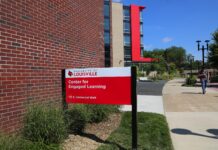LEXINGTON, Ky. (Aug. 8, 2011) — The University of Kentucky and the University of Louisville have joined a nationwide consortium pushing to advance the deployment of ultra-high-speed broadband Internet service to leading U.S. universities and their surrounding communities.
The coalition, named Gig.U, currently includes 29 colleges and universities. It aims to make gigabit networking connections — with data transfer rates about 100 times faster than the typical “high-speed” cable Internet connection — accessible to research institutions, businesses and residences in places like Lexington and Louisville.
“What we’ve been seeing over the past decade or so is that growth in broadband technology, at the point of delivery to the end-user, is stalling out in the United States,” said UK Chief Information Officer Vince Kellen. “Gig.U is working with industry and community leaders both to demonstrate the demand and to look for opportunities for the private sector to meet that demand on a community-by-community basis.”
UofL’s Chief Information Officer and Vice President Priscilla Hancock said access to high-speed computer networks is directly linked to progress and quality of life.
“:It is becoming increasingly clear that our ability to move forward as a nation and as a community is directly related to our ability to access vast amounts of information,” Hancock said. “If we can speed up computer networks, it’s the same as speeding up breakthroughs in science and business. High-speed networks stimulate economic development, as well as research collaboration, medical and educational access.”
Increasingly, Kellen says, ultra-high-speed connectivity is already vital to institutions like UK and UofL in data-intensive applications such as molecular dynamics modeling, next-generation medical imaging and telecommunications. But, Kellen says, a bigger data pipe would have a much broader appeal to business and residential consumers as well.
Possible applications include “smart grid” neighborhoods, which enable electric utilities to monitor power usage with great precision, to more efficiently meet demands. Another might be telemedicine, which would enable patients in remote, rural areas to be “seen” by a medical specialist 100 miles away. Residential users could look forward to better-quality streaming video, crystal-clear phone calls, and lightning-fast downloads.
“This is the kind of thing that really captures the imagination,” Kellen said. “But it is not science fiction. This is technology we can use now, today.”
Gig.U universities and their surrounding communities have the most favorable conditions for a market-based, ultra-high-speed broadband strategy, including dense populations and high demand from institutions and residential customers.
These communities have long served as partners and test-beds for advances in market segments ranging from healthcare and education to technology and energy. Through an open Request for Information (RFI) process, Gig.U will gather data on these specific segments with an intent to inform high-speed service providers of new implementation approaches and to enable competition to bring high-speed networks to research communities.
The group aims for the RFI process to translate into tailored Requests for Proposals for deploying cutting-edge networking technology to campuses and communities in a matter of years, rather than decades.
Lexington Mayor Jim Gray offered his support for Gig.U in a letter dated June 23.
“Lexington and the Bluegrass region have a concentration of institutions of higher education and a thriving high-tech community,” Gray wrote. “Both would benefit from the Gig.U initiative.”
Eric Einhorn, vice president of federal government affairs for Windstream, a high-speed Internet service provider, praised Gig.U’s initiative for promoting innovation.
“Gig.U is to be commended for focusing greater attention on the many ways in which communications services can benefit universities and research communities — communities that are producing cutting-edge technologies and cultivating the next generation of American innovators,” Einhorn said.
For more information about Gig.U, visit www.gig-u.org.




























